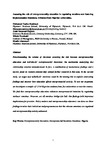Assessing the role of entrepreneurship education in regulating emotions and fostering implementation intentions: Evidence from Nigerian Universities
| dc.contributor.author | Haddoud, Mohamed Yacine | |
| dc.contributor.author | Onjewu, A | |
| dc.contributor.author | Nowinski, W | |
| dc.contributor.author | Alammari, K | |
| dc.date.accessioned | 2020-04-09T11:58:08Z | |
| dc.date.issued | 2020-05-05 | |
| dc.identifier.issn | 0307-5079 | |
| dc.identifier.issn | 1470-174X | |
| dc.identifier.uri | http://hdl.handle.net/10026.1/15554 | |
| dc.description.abstract |
Notwithstanding the volume of literature assessing the link between entrepreneurship education and individuals’ entrepreneurial behaviour, the mechanism underlying this relationship remains misunderstood. In fact, a combination of inconclusive findings and a narrow focus on western contexts duly compel further research in this area. In the current study, we argue that individuals’ emotions could be the missing link to explain contrasting findings and uncover how education affects entrepreneurial activity. To test our argument, we investigate a sample of 1314 Nigerian students from five universities across the country. We find that entrepreneurship education enhances entrepreneurial intention by regulating students’ emotions. However, not all emotions bridge this link. Our findings hold important implications for practice. Policy makers and entrepreneurship educators can draw on these findings to tailor their initiatives and programmes so that the relevant emotions are regulated and entrepreneurship activity is enhanced. | |
| dc.format.extent | 450-468 | |
| dc.language | en | |
| dc.language.iso | en | |
| dc.publisher | Taylor & Francis (Routledge) | |
| dc.subject | Entrepreneurship education | |
| dc.subject | entrepreneurial intention | |
| dc.subject | emotions | |
| dc.subject | Nigeria | |
| dc.title | Assessing the role of entrepreneurship education in regulating emotions and fostering implementation intentions: Evidence from Nigerian Universities | |
| dc.type | journal-article | |
| dc.type | Journal Article | |
| plymouth.author-url | https://www.webofscience.com/api/gateway?GWVersion=2&SrcApp=PARTNER_APP&SrcAuth=LinksAMR&KeyUT=WOS:000532369500001&DestLinkType=FullRecord&DestApp=ALL_WOS&UsrCustomerID=11bb513d99f797142bcfeffcc58ea008 | |
| plymouth.issue | 2 | |
| plymouth.volume | 47 | |
| plymouth.publication-status | Published | |
| plymouth.journal | Studies in Higher Education | |
| dc.identifier.doi | 10.1080/03075079.2020.1758652 | |
| plymouth.organisational-group | /Plymouth | |
| plymouth.organisational-group | /Plymouth/Faculty of Arts, Humanities and Business | |
| plymouth.organisational-group | /Plymouth/REF 2021 Researchers by UoA | |
| plymouth.organisational-group | /Plymouth/REF 2021 Researchers by UoA/UoA17 Business and Management Studies | |
| dcterms.dateAccepted | 2020-04-08 | |
| dc.rights.embargodate | 2021-11-5 | |
| dc.identifier.eissn | 1470-174X | |
| dc.rights.embargoperiod | Not known | |
| rioxxterms.versionofrecord | 10.1080/03075079.2020.1758652 | |
| rioxxterms.licenseref.uri | http://www.rioxx.net/licenses/all-rights-reserved | |
| rioxxterms.licenseref.startdate | 2020-05-05 | |
| rioxxterms.type | Journal Article/Review |


